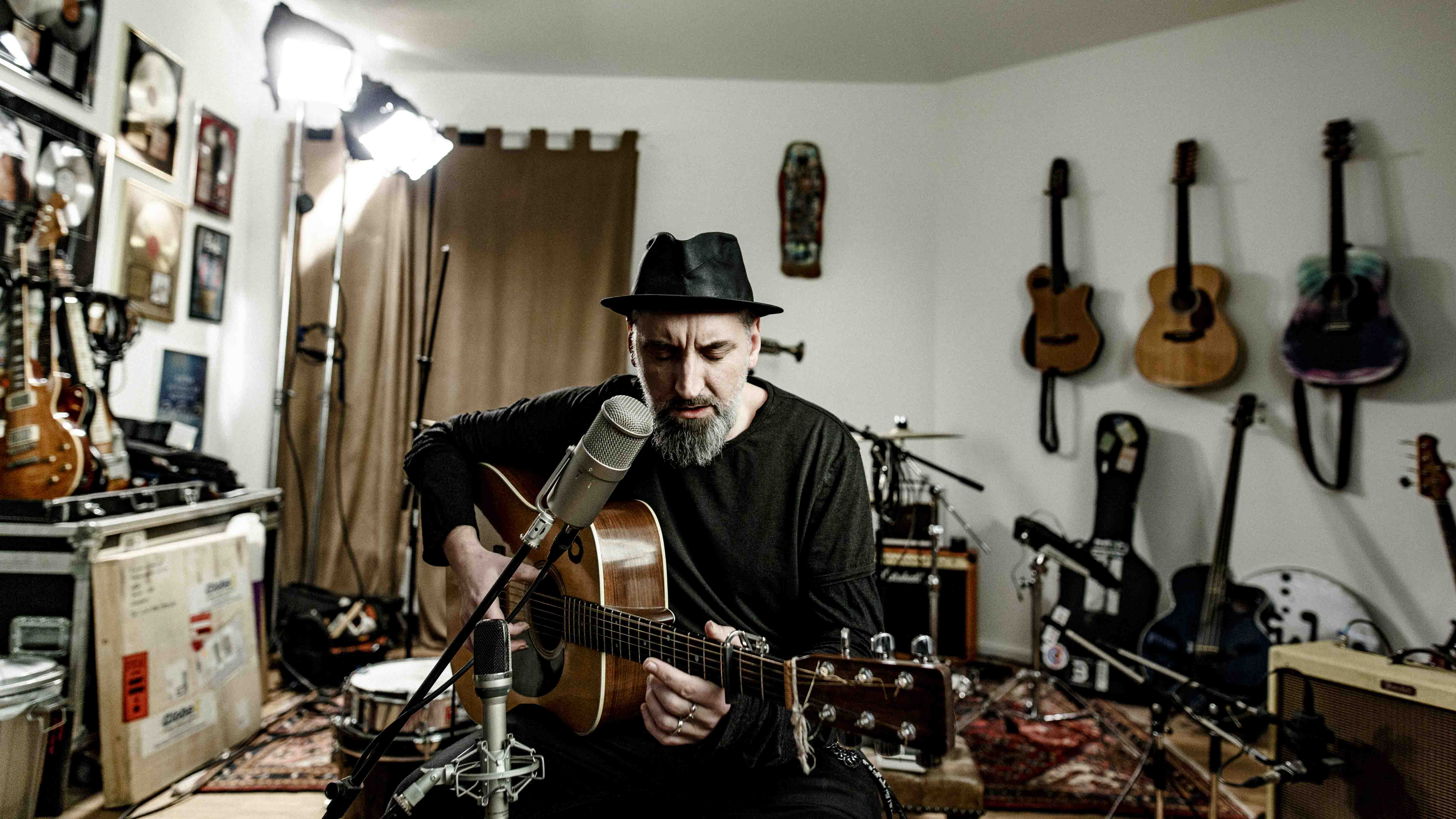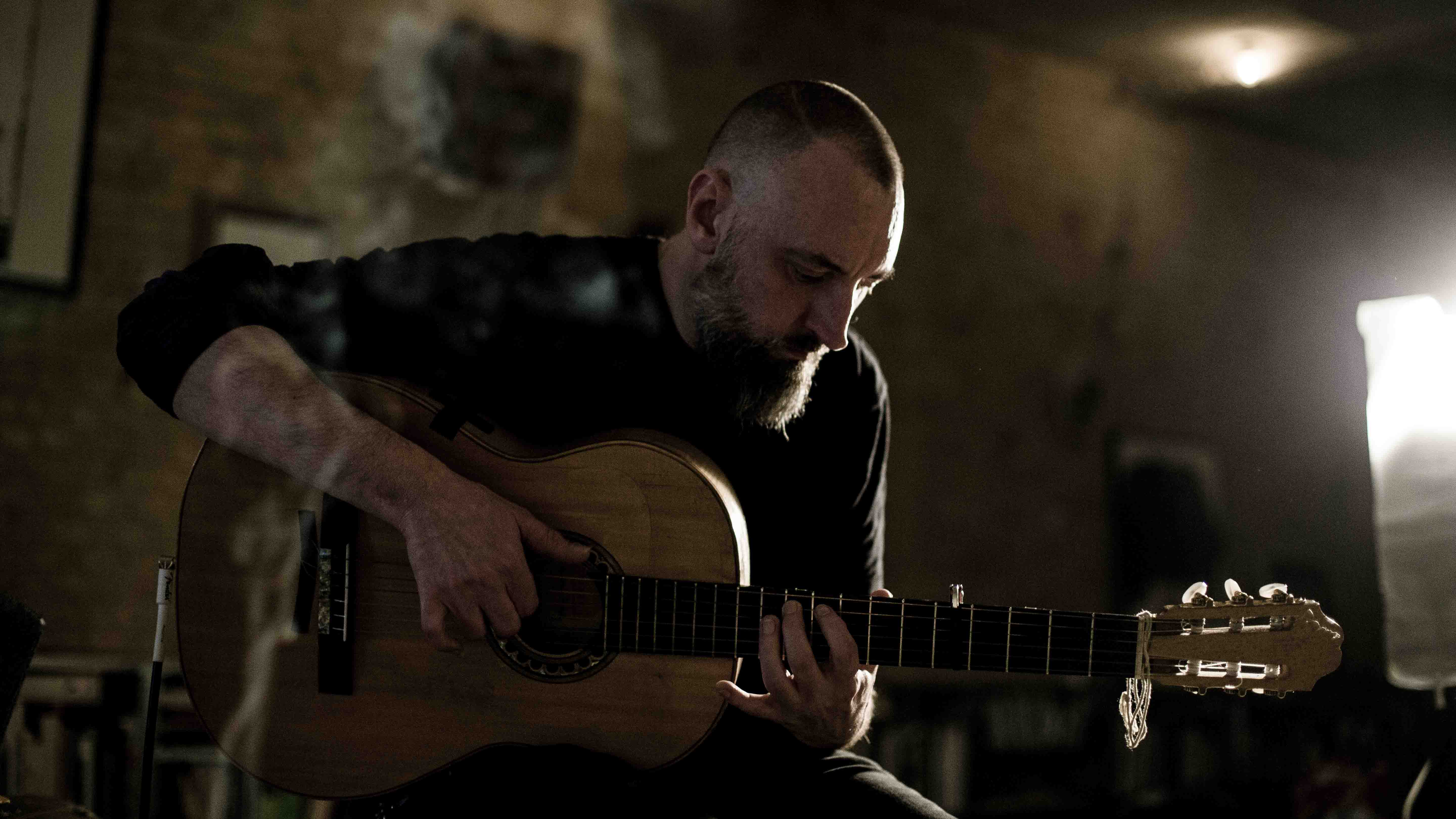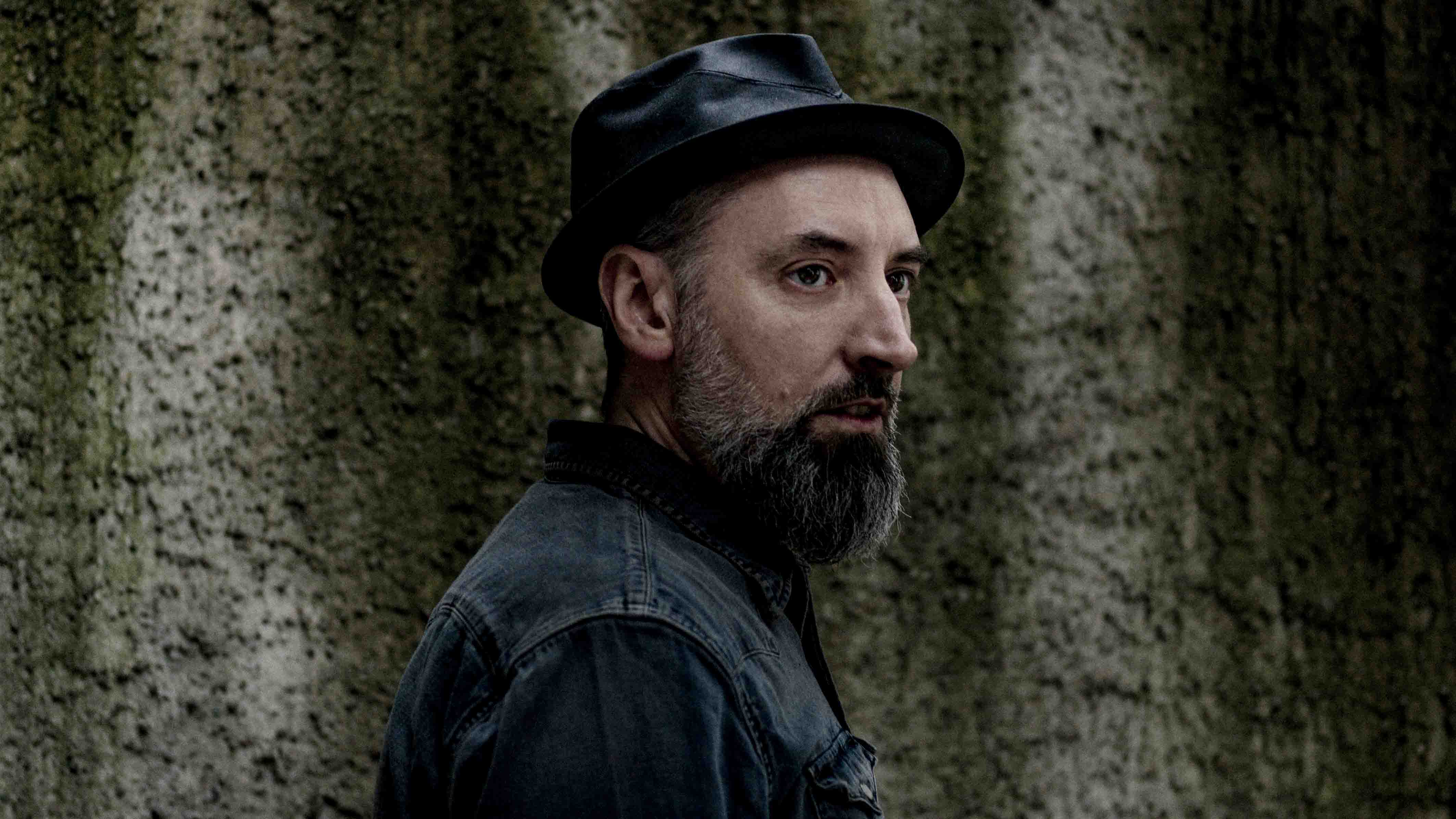Fink on guitar gear, production tricks and the challenges of making an authentic modern blues record
“‘I woke up this morning’ - that’s off the table”

Sunday Night Blues Club
Singer-songwriter Fin Greenall is best known by his nom-de-plume Fink, a name shared with his trio, completed by bassist Guy Whittaker and drummer Tom Thornton.
The Ninja Tune-signed songwriter has always been an individual, a genre magpie channeling trip-hop, desert rock and dub, while others endlessly rehash their Dylan influences. Similarly, his production and songwriting credits extend well beyond your typical folk club, to work with John Legend, Professor Green, Amy Winehouse and Banks.
Now based in Berlin, Fink has released 10 albums (including side-projects/live records) in 10 years and recently took time out to tackle a new challenge: a contemporary blues record.
The response is Sunday Night Blues Club, Vol 1, an album that has been produced by Flood and places luminaries like Colin Stetson (Arcade Fire, Bon Iver), Mike Dawes and New Orleans sticksman David Shirley in the role of pick-up band.
Prizing feel and a run-and-gun writing process over six-string dick-swinging, it’s a powerfully effective, left-of-field take on 21st century blues.
We spoke to Fin to find out more about the challenges of taking on one of the most thoroughly “rinsed” areas of modern music history…
You’ve previously been something of a genre-spanning type. Is Sunday Night Blues Club, Vol. 1 your first genre record?
Some of my records are too ‘genre-spanning’, maybe, so on this blues record it was a really great opportunity to do the opposite of that
“Genre-spanning! I like that. Some people see it as a fault and I think that’s kind of justified - some of my records are too ‘genre-spanning’, maybe - so on this blues record it was a really great opportunity to do the opposite of that and actually have some focus.
“There’s one track on the record, She Was Right, which was this amazing, epic orchestral piece with Colin Stetson, who’s a genius at this wind, circular-breathing stuff. That’s the only track where it’s really ‘blues meets…’; every other track on the record, the whole raison d’être is, ‘If you don’t like blues, you’re not going to like it.’
“That kept me on the straight and narrow with this one, because every time I wanted to add some electronic influences, or add a poly-synth, or say, ‘Maybe I’ll just do a little folky, major, Joni Mitchell thing here’ it always stopped me, because I thought, ‘I want to make a blues record and I want to keep the focus.’ So, yeah, this record is probably the first one where I’ve made a genre record.”
You can trace links to the blues in so many of your other influences – trip-hop, folk, rock, desert rock. Why now for a blues album?
“I’ve just needed to do it to get something out of my system. I’ve always loved the blues, and I just needed to see if I could do it. This is the first time I’ve had the confidence to own it all, to say ‘this is going to be my blues’ - ‘my accidental life’, as Big Bill Broonzy used to say.
“Having said that, one of the real challenges of the record was to write original blues, because it’s one of the oldest genres that we’ve got in modern musical culture, so it’s been used and abused for 70/80 years now.
“Most of the ideas have been done, rinsed and repeated, so to try and find the right balance was a real challenge. I didn’t want to do any lyrics like ‘I Whatsapped you’, but I also didn’t want to go too retro, putting in lyrics about rivers and Mississippi, because that’s not my journey at all.”

Gear of yore
You have many different collaborators on this album yet there’s a real uniformity to the sound. Did you issue a tight brief to your musicians?
“No brief at all. With the Colin Stetson collabs I just sent him the tracks and used whatever he sent back. With the drummers, I briefed one of them for this track Black Curls. It was this guy Hugo [Degenhardt], who’s drummer for the Bootleg Beatles, and I wanted a rolling, 10-minute 'Ringo Starr in 1965' kind of feel to it and he did it perfectly. But, again, I used his take, unedited and plopped it over the top.
“I think the coherency comes from Flood, the producer. When I took my tracks, which I thought were pretty done, to Flood for mixdown, he was so clever. He took the one track that he thought was the closest to the sound we wanted - I think it was Keep Myself Alone Now - and he said, ‘Right, the mission is to bring all the tracks to the level of this one, so we’ll bring them up or scruff them down and make them sound like they’ve come from the same moment.’
“After Flood had got his grubby little fingers on it, what came out of the mixdown was next-level shit. He would mix it down so loud that all the levels on all of the machines were red. I think that captured some of the energy, cranking it right to the edge.”
Was that all-analogue at the root then? Not a lot of people like to crank digital signals, for good reason…
“Flood used a really nice balance of in-the-box tricks and nice outboard. We re-taped a lot, I re-amped a lot in the studio, just to get the air and the space, so when we took it to mixdown the bits and pieces were all very legit. I really didn’t do much to them.
Those guys were geniuses back in [the '60s]… they were using the room as their plugin
“It’s that old-school technique of, ‘If you wanna put reverb on it - put it on it and record it’, so you use the reverb on your amp. You do what John Lee Hooker would have done in 1962 - those guys were geniuses back in those days, with the balances and EQs, because they were using the room as their plugin, rather than outboard gear.
“I talked to Flood about some of the artists he’s worked with over the years, and quite often he’d be telling me stories where he’d be like, ‘Oh, the microphone I used for that take was a Beta 58’ and you’d be like ‘What? It wasn’t a Neumann £20,000 ribbon mic?’ He’d be like, ‘No. It’s a Beta 58 and it sounds great.’ It’s the take not the kit that counts.”
What kind of gear did you use to record Sunday Night Blues Club?
“The Gretsch is an old Tim Armstrong model. I bought it because it was matt black, and I believe the terminology was ‘murdered-out’ back in those days. It’s toured with me and had a bit of road wear. I played it quite a lot on the Hard Believer tour.
“The nylon-string tracks are on my Brady III, which is made by this guy called Mal Brady up in north of England. Then I’ve got, we call it the Orwell, it’s a 1984 Martin D-28.
“Amp-wise, I used this beautiful Fender ’68 Silverface, which I rented from this amazing guitar-maker in Berlin called Dr. Lutz [aka the GuitarDoc]. He’s got a shop and I saw this Silverface in there and I rented it out for the first half of the record, so now I’ve got my own, which is really delicious.
“Then a straight-up Fender Twin, which is one of the Tweed-y ones. It’s been on the road for 10 years now and it looks like it’s really been toured. It sounds beautiful.
“I rarely used my pedalboard. On a few tracks, like Little Bump, I used my Space Echo to get a kind of modern effect on some key notes, just pulling it into my space, as opposed to being super-retro and having a double-bass and shuffle-y drums. The subject matter is pretty modern, too, on that one.”

Nothing but the truth
What did having that desire to create a contemporary blues record do for your lyrical content? Did you find yourself falling foul of cliché?
When a white guy from Europe is tackling the blues, you’ve definitely got to make it your own
“Of course. Obviously, with blues, the clichés are very, very obvious - you know when you’re going off-piste. So, ‘I woke up this morning’ - that’s off the table. ‘My baby left me’ - that’s off the table. It’s so obvious what’s not cool, you know?
“Really, it was about channeling a feeling. With a track like Boneyard, I’m going through a big issue - death - and I can’t write an essay; I’ve got three lines to do it in.
“It’s just: ‘don’t think too hard; what are you feeling right now?’ If the answer is, ‘Man, I’m feeling really shit right now’, you’re off. It’s honest and you’ve got to own it. You’ve got to anyway, but when a white guy from Europe is tackling the blues, you’ve definitely got to make it your own or it’s going to be pretty obvious that it’s not your music.”
What was the most enjoyable thing about making this album?
“Just the fact that every day you might have that feeling that when you get home, something that didn’t exist this morning now exists. It might be ugly and stupid, but it still exists. It didn’t and now it does, so it’s almost like birth and rebirth on a daily basis.
“I really, really loved that process with the blues, because three/four days a week I’d get nothing but clichés and then on the Friday I’d come home with Hour Golden in my pocket, which didn’t exist that morning.”
That’s creativity in its most pure form, really, isn’t it? At first it didn’t exist and now it does…
“Yeah, channeling your inner feelings. The minute you start double-thinking yourself, you lose so much good shit. You can’t lose if you’re honest.“
Sunday Night Blues Club, Vol 1 is out now on R'COUP'D.
Matt is a freelance journalist who has spent the last decade interviewing musicians for the likes of Total Guitar, Guitarist, Guitar World, MusicRadar, NME.com, DJ Mag and Electronic Sound. In 2020, he launched CreativeMoney.co.uk, which aims to share the ideas that make creative lifestyles more sustainable. He plays guitar, but should not be allowed near your delay pedals.
